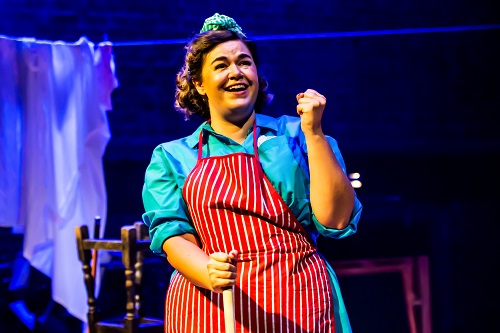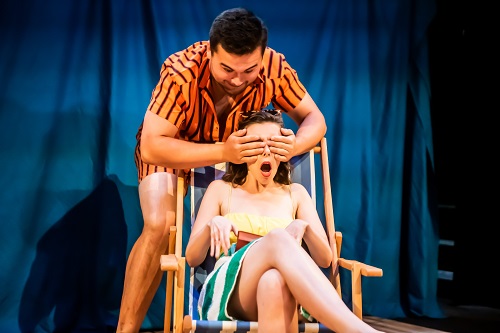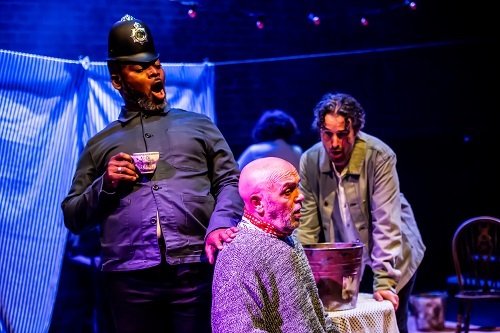Two days, two boatswains’ mates: the first, genuine navy lad Bill Bobstay, sailing the seas aboard Captain Corcoran’s H.M.S. Pinafore; the second, ex-soldier Ned Travers, partner-in-intrigue to former boatswain Harry Benn, as the latter attempts to persuade the indomitable, intransigent Mrs Waters that she really does need a man in her life.
One imagines that Ethel Smyth had an affection for her protagonist, the landlady of The Beehive, whose independence of spirit and self-sufficiency shape the plot of Smyth’s fourth opera, the one-act, two-scene comedy The Boatswain’s Mate, which she composed in 1914. For, Smyth’s entire life and career were dedicated to ensuring that women were deemed to be equal to men. For two years, putting a promising musical career on hold, she actively partook in the Women’s Suffrage Movement, and is said to have modelled Mrs Waters on Emmeline Pankhurst, the leader of the Women’s Social and Political Union, for whom she had great admiration. Moreover, Smyth quotes liberally from her own suffragette anthem, ‘The March of the Women’, in the overture to the opera.
It’s not political radicalism that is at the heart of The Boatswain’s Mate, though, but the pursuit of romance. Adapted by the composer from a short story by W.W. Jacobs, the action concerns the lonely, retired boatswain, Harry Benn, who persists doggedly in his marriage proposals to the spirited Mrs Waters. When his awkward advances are repeatedly met with contemptuous rejection, he abandons fair play for a false ploy to convince the landlady that she’s looking for love. Having persuaded the ex-soldier Ned Travers to fake a nocturnal burglary at The Beehive, Benn arrives at the scene of the ‘crime’ expecting to come to the widow’s rescue and secure her gratitude – and thus her acquiescence to accompany him up the nuptial aisle. What he finds is his ‘future wife’ clutching a shotgun. She confesses to have killed the intruder, and her plans for the latter’s burial alarm Benn so much that he heads to the police station. The exposure of the ‘murder’ brings a few more surprises for Benn …

The Boatswain’s Mate was Smyth’s most popular work during her lifetime. The opera was to have been premiered at Frankfurt-am-Main, fourteen days after the revival of The Wreckers at Munich under Bruno Walter, but the outbreak of war scuppered both performances. The premiere of Smyth’s comic opera eventually took place at London’s Shaftesbury’s Theatre on 28th January 1916, with Smyth herself conducting Sir Thomas Beecham’s newly formed opera company. It later notched up some notable performances at the Old Vic Theatre, when Lilian Baylis was director. This Spectra Ensemble production, directed by Cecilia Stinton and produced by Jessie Anand, was first seen in the Arcola Theatre’s small studio theatre four years ago, during the 2018 Grimeborn Festival. This revival transports it to larger main theatre.
Stinton purports to have moved the action from the original rural locale at the start of the twentieth century, to the seaside resort of Margate during 1953, Coronation year, but Ellie Roser’s design and costumes do little to indicate a time and place. There’s some decking and netting which, together with a smart mime during the overture involving a deckchair and beach ball – as Beca Davies’ Mary Ann (Mrs Waters’ maid) fights off Philippe Durant’s attentions (she’s more interested in her book than her boyfriend) – place us beside the sea. But, the set is minimal: just a couple of scruffy stools to gesture at a pub saloon and a white-draped dressing-table to suggest a parlour.
The two parts of the opera are disparate in style, the first employing spoken dialogue in the Beggar’s Opera tradition which G&S brought to a peak, the second through-composed and ‘heavier’. Smyth made various orchestrations of her score, two for reduced forces. Musical director John Warner has pared things down further and leads an ensemble of three from the keyboard, accompanied by violinist Emily Earl and cellist Meera Priyanka Raja. ‘I want a great rollicking sound’, Ethel Smyth apparently told the BBC Symphony Orchestra during rehearsals in 1914. Well, the piano trio doesn’t give us that, and a bigger ensemble might have produced more musical ebullience – after all this Smyth’s opera is lively, genuine musical theatre. But, the three musicians do perform sensitively in the instrumental episodes, especially the Intermezzo between the two parts of the opera, and provide tidy, helpful support.

Spectra Ensemble’s production might make more of the comedy, though, given that the plot leans towards British music hall traditions and the music itself has a light touch, making use of several folk songs, including ‘The keeper did a-shooting go’, ‘The cruel mother’, and ‘Oh dear, what can the matter be?’ There’s musical wit, too, both subtle – harmonic shadings such cast a wry eye at the text – and overt, such the quotation of the motto motif from Beethoven’s Fifth Symphony as fate knocks at the door and the Policeman arrives. Moreover, Jacobs’ story has a Dickensian vividness, although the libretto that Smyth herself adapted is rather wordy. The text sometimes struggles to come across clearly at the Arcola, however, and the second scene lacks the sort of comic drive that would have really engaged directly with the audience, in the manner of the best ‘pub theatre’.
What the production does offer is some superb singing and characterisation. Josephine Goddard is excellent as the feisty, forthright landlady, progressing from the domineering determination of the first part to the wistful reflections of the second in a wonderfully ardent aria, ‘What if I were young again’. It’s a powerful moment, a real highlight, as the strait jacket of self-restraint is loosened and a loneliness both physical and emotional is revealed.

John Upperton returns to his 2018 role as Harry Benn. He’s clearly on the make but the crafty chancer displays sufficient melancholy to persuade that he does have feel genuine affection and thus garner some sympathy. Upperton has a good rapport with Shaun Aquilina, also returning to the production as Ned Travers, and both singers bring clarity and presence to the musical characterisation. Aquilina’s chemistry with Goddard is convincing, unleashing as it does tidal waves of feeling. Robert Winslade Anderson’s performance as the PC Plod investigating a murder-that-never-was is a fine, warmly sung cameo. The role of Mary Ann seems somewhat redundant, but Davies makes of it what she can, and Durrant makes a worthy contribution to the ensemble. The drunken chorus which concludes part one features some delightful woozy chromaticism.
In 1877, at the age of nineteen, Smyth had overcome her father’s reluctance to support her ambition to be a composer, and travelled to Leipzig to study at the Conservatory. She formed a strong friendship with Elizabeth von Herzogenberg in whose house she met many of the leading musicians of the date, including Brahms, Grieg and Tchaikovsky. The friendship was ruptured in 1885 when a relationship between Smyth and Elizabeth’s brother-in-law, Henry Brewster, began to develop – a relationship that lasted, clandestinely, until Brewster’s death in 1908. On the death of his first wife, Brewster asked Ethel to marry him. She declined, fearing the loss of her independence.
One wonders what prospects Smyth – a woman who undoubtedly forged her own destiny – prophesised for Mrs Waters? For the latter’s attraction to Travers is evident at the end of the opera, and she seems to recognise that the future might not be a lonely one after all – that her best days might be still to come, even if she has to accept being ‘just’ a landlord’s wife.
Claire Seymour
Ethel Smyth: The Boatswain’s Mate
Mary Ann/Ensemble mezzo – Beca Davies, Ensemble tenor – Philippe Durant, Mrs Waters – Josephine Goddard, Harry Benn – John Upperton, Ned Travers – Shaun Aquilina, Policeman/Ensemble bass – Robert Winslade Anderson; Director – Cecilia Stinton, Musical director – John Warner, Set and Costume designer – Ellie Roser, Lighting designer – Catja Hamilton
Grimeborn Festival, Arcola Theatre, Dalston, London; Wednesday 10th August 2022.
ABOVE: Shaun Aquilina (Ned Travers) and Josephine Goddard (Mrs Waters) (c) Lidia Crisafulli